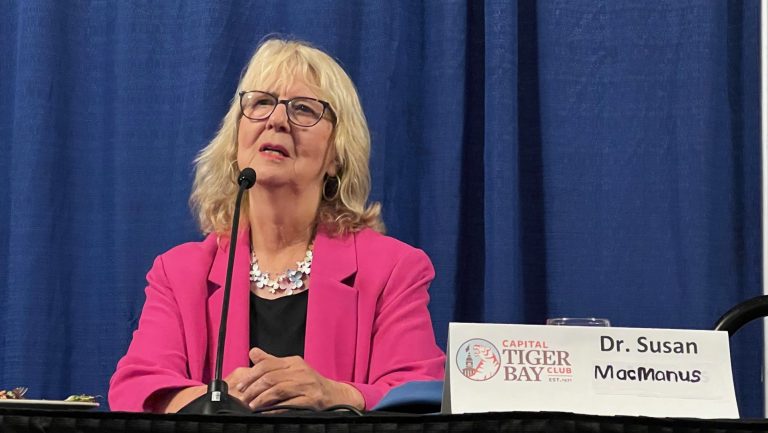The 2024 election may be remembered as when the Florida Republican Party solidified its control over a once-fractious swing state and exposed its Democratic counterpart as a broken shell of a political party.
That’s according to retired University of South Florida political science professor Susan MacManus, who attended a Capital Tiger Bay Club luncheon Monday for an in-depth analysis of the election results.
“If there’s a state that’s showing the idea that universal advertising doesn’t work, you’re sitting in it,” she told an audience of nearly 100 people.
She set the stage: Democrats had run the state for a hundred years, but a resurgence of the Republican Party in the 1990s toppled the Legislature. While Republicans have led the state since then, Democrats have not won a statewide election since 2018, when Nikki Fried was elected agriculture commissioner.
Last month, Democrats suffered another resounding rebuke from voters when President-elect Donald Trump won 61 of 67 counties, the Republican Party maintained the supermajority in the Florida Legislature and delegation of Congress, and that Republican candidates increased their vote totals in 90% of Florida’s counties.
The Republican Party has broken the coalition of Democratic voting blocs into pieces. They succeeded, MacManus explained, because Democrats based their campaign on faulty assumptions about voters, based on stereotypes not supported by publicly available data.

She said Democrats’ assumptions about identity politics — or voters of a certain religion, race, ethnicity, gender, etc. – as a monolithic block do not constitute a winning strategy.
“When you look at how different racial groups voted, you can see that they are evenly divided,” MacManus said.
Democrats, MacManus said, were convinced that higher turnout in a presidential election year would erase the million-voter advantage that Republicans had built since 2020, but Trump carried the day. Florida by 13 points and even won Osceola County, which Hillary Clinton won by 25 percent. in 2016.
This confidence was born from the assumption that reproductive rights were voters’ No. 1 concern when the economy was, that young voters (18-42) are solid liberal Democrats when 40% of them They are registered without party affiliation, and that Hispanics, women and blacks are all monolithic.
“The stereotypes were that all these solid blocks of voters were (theirs). They (voters) didn’t feel that way at all because the blocs themselves became divided,” MacManus said.
Even if people don’t buy what Democrats are selling, the Republican Party continues to do voter registration and outreach throughout the year “and they’re very good at determining when new people are s ‘settle in an area, contact them and register them as Republicans,’ MacManus. said.
MacManus places part of the blame for the election night failure on the Democratic National Committee’s tight control over campaign messaging. In an explanation of the voting patterns of Florida’s Asian, Pacific Rim, Hispanic and black residents, she said out-of-state political consultants and experts don’t understand the extent to which the views of racial groups in Florida are diverse.
MacManus said the election was clearly about the economy, cited as the No. 1 issue by 71% of voters surveyed, while Democrats focused their campaigns on abortion rights – coming in fourth. in most polls. Prices of household goods have risen more than 5% under President Joe Biden, the highest rate since the Carter administration presided over a 10% increase.
“Yet 90% of ads for Democrats in Florida were based on the abortion amendment. It was just a simple oversight of looking at the data available on how you do a campaign,” MacManus said.
Florida Democrats have complained they lack the money to compete with the Trump and Republican campaigns. In an eight-post post on X after the election, Jasmine Burney-Clark, who ran the Florida campaign for Vice President Kamala Harris, complained about having only $5 million.
MacManus countered that Democrats’ problems in Florida can’t be solved by money alone.
“They’re going to have to go back to square one, be honest about these results and find a better way to get a sense of what voters are concerned about,” MacManus said.
James Call is a member of the USA TODAY NETWORK-Florida Capital Bureau. He can be reached at jcall@tallahassee.com and is on @AppelTallahassee.


